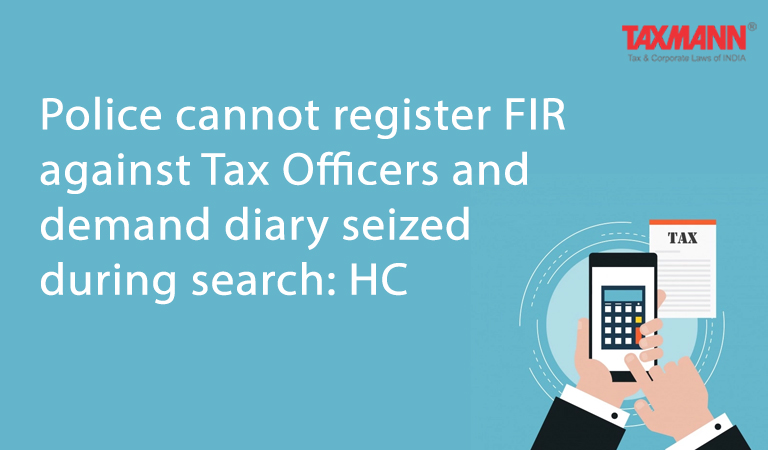Police cannot register FIR against Tax Officers and demand diary seized during search: HC
- Blog|News|Income Tax|
- 2 Min Read
- By Taxmann
- |
- Last Updated on 8 December, 2021

Case Details: Director General of Income Tax (Investigation) v. Deputy Commissioner of Police, Bengaluru (East Division) - [2021] 133 taxmann.com 54 (Karnataka)
Judiciary and Counsel Details
-
- M. Nagaprasanna, J.
- K.V. Aravind, Adv. for the Petitioner.
- Smt. Namitha Mahesh B.G., K. Shashikiran Shetty, Sr. Adv. and Sandeep, Adv. for the Respondent.
Facts of the Case
Income-tax Officers (revenue) conducted search and seizure proceedings under section 132 on the residential premises of the assessee. Several incriminating documents, including a diary, were found and seized. The diary had recordings of various transactions with abbreviations and amounts against each of the abbreviations. At that point in time, the assessee was holidaying in Goa.
Later, the assessee registered an FIR alleging that there was gross violation of the procedure adopted in the search and certain documents that were seized and particularly the diary. The Police issued a notice under section 91 of the Cr.PC directing revenue to hand over the diary. The Police also directed revenue to divulge the names of persons who had conducted the search and seized the documents. Revenue filed the writ petition before the Karnataka High Court, contending that registration of FIR was not maintainable.
High Court Held
The High Court held that section 293 of the Income-tax Act, mandates that no suit shall be brought in any civil Court to set aside or modify any proceeding taken or order made under the Income-tax Act. Further, no prosecution, suit or other proceedings shall lie against the Government or any officer of the Government for any act done in good faith.
The bar that operates under Section 293 is twofold, i.e., no proceedings shall be instituted before a civil court, and no prosecution shall lie against the Government or any officer of the Government for anything done under the Income-tax Act.
Admittedly, the Income-tax Officers perform search and seizure under the Income-tax Act. The bar of divulging any information or document taken into custody during the seizure is available under Section 138(2). In the teeth of the said provision, the registration of the FIR was bad in law, as the recording of FIR against officers of Government, who have performed certain acts of search and seizure under Section 132, cannot be brought to prosecution.
It is rather shocking that the Police wanted only the diary seized during the search, and no other document was sought for investigation. It seems that Police was acting at the behest of the assessee to secure the diary by invoking Section 91 of the Cr.P.C. Accordingly, the writ petition is allowed, and FIR registered against Tax Officers & all further proceedings taken up according to it stand quashed.
Disclaimer: The content/information published on the website is only for general information of the user and shall not be construed as legal advice. While the Taxmann has exercised reasonable efforts to ensure the veracity of information/content published, Taxmann shall be under no liability in any manner whatsoever for incorrect information, if any.

Taxmann Publications has a dedicated in-house Research & Editorial Team. This team consists of a team of Chartered Accountants, Company Secretaries, and Lawyers. This team works under the guidance and supervision of editor-in-chief Mr Rakesh Bhargava.
The Research and Editorial Team is responsible for developing reliable and accurate content for the readers. The team follows the six-sigma approach to achieve the benchmark of zero error in its publications and research platforms. The team ensures that the following publication guidelines are thoroughly followed while developing the content:
- The statutory material is obtained only from the authorized and reliable sources
- All the latest developments in the judicial and legislative fields are covered
- Prepare the analytical write-ups on current, controversial, and important issues to help the readers to understand the concept and its implications
- Every content published by Taxmann is complete, accurate and lucid
- All evidence-based statements are supported with proper reference to Section, Circular No., Notification No. or citations
- The golden rules of grammar, style and consistency are thoroughly followed
- Font and size that’s easy to read and remain consistent across all imprint and digital publications are applied



 CA | CS | CMA
CA | CS | CMA
